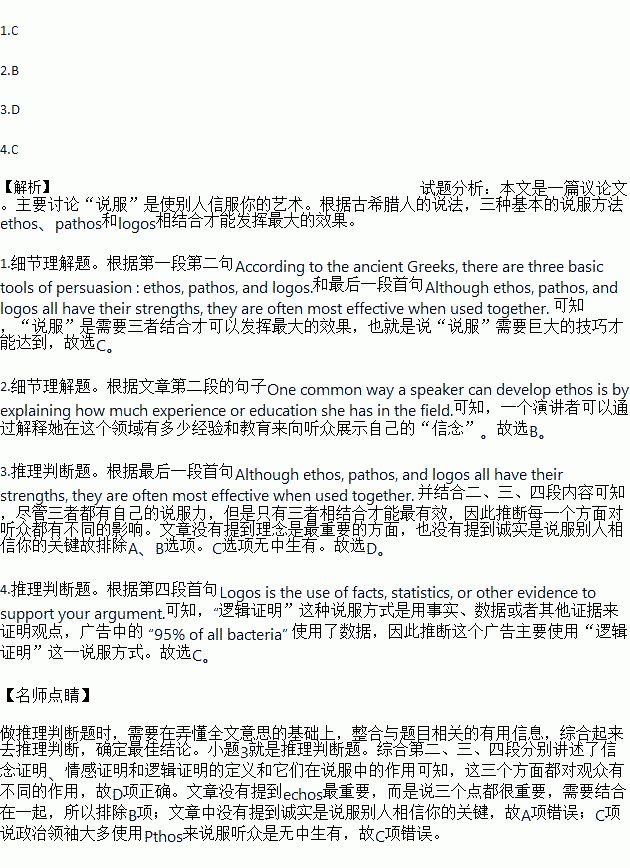题目内容
Persuasion is the art of convincing someone to agree with you. According to the ancient Greeks, there are three basic tools of persuasion : ethos, pathos, and logos.
Ethos is a speakers’ way of convincing the audience that she is trustworthy, honest and reliable. One common way a speaker can develop ethos is by explaining how much experience or education she has in the field. After all, you’re more likely to listen to advice about how to take care of your teeth from a dentist than a fireman. A speaker can also create ethos by convincing the audience that she is a good person. If an audience cannot trust you, you will not be able to persuade them.
Pathos is a speaker’s way of connecting with an audience’s emotions. For example, a politician who is trying to convince an audience to vote for him might say that he alone can save the country from a terrible war. These words are intended to fill the audience with fear, thus making them support him. Similarly, an animal charity might show an audience pictures of injured dogs and cats, to make the viewers feel pity. If the audience feels bad for the animals, they will be more likely to donate money.
Logos is the use of facts, statistics, or other evidence to support your argument. An audience will be more likely to believe you if you have convincing data to back up your claims. Presenting this evidence is much more persuasive than simply saying “believe me”.
Although ethos, pathos, and logos all have their strengths, they are often most effective when used together. Indeed, most speakers use a combination of ethos, pathos, and logos to persuade their audiences. So, the next time you listen to a speech, watch a commercial, or listen to a friend try to convince you to lend him some money, be on the lookout for these ancient Greek tools of persuasion.
1.Why does the author say persuasion is an art?
A. They both demand full attention from the audience.
B. They both entertain the audience.
C. They both require great skill to achieve.
D. They were both common topics of ancient Greek writers.
2.How is a speaker able to show her ethos to the audience?
A. By using beautiful language to make her statements attractive.
B. By showing her knowledge and experience relating to the topic.
C. By expressing her sympathy with the audience.
D. By telling the audience about her personal preference.
3.What can we learn about the three aspects of persuasion?
A. Honesty is the key to making your arguments believable.
B. Ethos is the most important aspect of persuasion.
C. Political leaders mostly use ethos to persuade their audience.
D. Each aspect has a different effect on the audience.
4.An advertisement for washing powder which claims “Our powder kills 95% of all bacteria.” It mainly used_________.
A. ethos B. pathos
C. logos D. a combination of all three
 发散思维新课堂系列答案
发散思维新课堂系列答案
